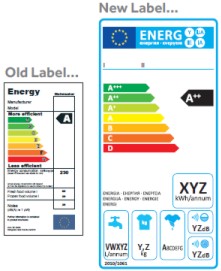Tips to save energy at home
Choose the most efficient appliance
Are you buying a new appliance? Then choose one that fits your household: a large fridge or television uses more electricity than a small one. When purchasing new household appliance also keep an eye out for a model which bears the EU energy label. The EU energy label provides you with information about energy consumption and overall energy performance of a household appliance with colors ranging from dark green (high energy efficiency) to red (low energy efficiency).

Lower capacity, lower electricity costs
Compare the annual electricity costs of the different appliances you have in mind. If they're not known, then look at the energy label (A+++ is most energy efficient) or ask about the capacity: an appliance with a lower capacity uses less electricity.
When buying a new household appliance also ask your local retailer for the most energy efficient device in stock. Opting for the cheapest unit is not necessarily the best option since a more efficient and expensive unit might save you a large amount of money off your electricity bills in the long run. You can also compare the energy performance of various household appliances on the Internet beforehand.
Here are some further tips how you can save energy in the household by using your appliances wisely:
Dishwasher
- Air dry dishes instead of using your dishwasher's drying cycle. If you don't have an automatic air-dry switch, turn off the control knob after the final rinse and prop the door open slightly so the dishes will dry faster.
- Scrape, not rinse, off large food pieces before washing.
- Be sure your dishwasher is full, but not overloaded, when you run it. A full load is more energy efficient than two half loads.
Refrigerator, Freezers and combinations
- Don't set your refrigerator or freezer too cold. This will create excessive moisture and ice build-up and consume more electricity to sustain the lower temperatures.
- Regularly defrost freezers; frost buildup decreases the energy efficiency of the unit. Don't allow frost to build up more than one quarter of an inch.
- Make sure your refrigerator door seals are airtight. Test them by closing the door over a piece of paper so it is half in and half out of the refrigerator. If you can pull the paper or bill out easily, the latch may need adjustment, the seal may need replacing, or you might consider buying a new unit.
- Cover liquids and wrap foods stored in the refrigerator. Uncovered foods release moisture and make the compressor work harder. Also, don't put warm or hot food straight into the freezer - let it cool down fist.
- Each time you open the door on the refrigerator, up to 30% of the cooled air can escape. Therefore, pay attention to open the door once and bring out or put in all the items required at one time instead of opening the door multiple times.
- Leave adequate ventilation space at the back and top of your fridge or freezer.
Washing Machine
- Don't over-spin clothes. Our favorable climate allows air drying in the sunshine so if possible use a low spin speed setting. This will save on the energy consumption of the machine.
- Wash your clothes in cold water using cold-water detergents whenever possible.
- Fill the machine to its capacity. A full load of washing is more energy efficient that two half loads.
Office Equipment
- Use energy efficient appliances. Along with saving energy directly, this equipment can reduce air conditioning loads, noise from fans and transformers, and electromagnetic field emissions from monitors.
- Turn off your computer and monitor when not in use.
- Make sure power management is activated on your computer.
- Unplug your chargers. Don't let your cell phone, camera or iPod charger sit in the outlet when not in use. Power is continually drawn through the charger, whether your device is plugged in or not. If you leave it plugged in, the charger will continue to use 95% of the electricity it uses to charge your phone.



























